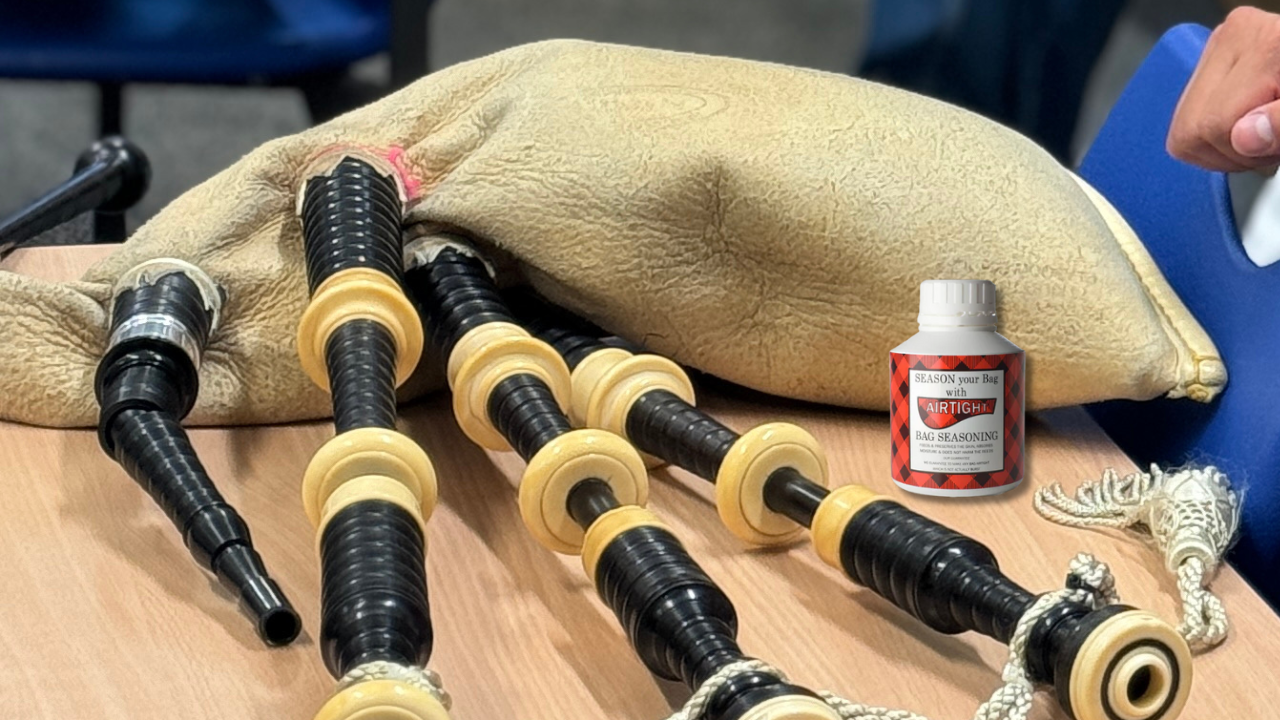Finding the Right Chanter Reed For You: The Scotland the Brave Test
May 22, 2024
Your bagpipes should never be too hard to play.
You should feel comfortable at all times when you’re playing. Don’t feel like you have to “be tough’ and struggle through with a hard chanter reed. You shouldn’t barely get through more than a few bars at a time without feeling light-headed. And you definitely shouldn’t feel like you might be blowing so hard you’ll cause injury (hernias can be a real concern)!
Bagpipe instrument maintenance is an important part of this. That includes having an airtight bag, tight joints, and well calibrated drone reeds. But if your pipe chanter reed is too hard for you, then no matter how much maintenance you do, there’s no chance your pipes are going to feel comfortable.
Factors That Contribute to the Strength of Reed You’ll Play
“Is my chanter reed the right strength for me?”
This is one of the most common questions that pipers at all levels have. But it’s an especially tricky one to answer when you’re just starting out, and don’t know too much about how bagpipe chanter reeds work yet.
How often have you dreaded getting a new chanter reed? And maybe even suffered for weeks working with a worn-out reed that’s squeaking or crowing, just to avoid getting a new “gut buster”)?
I don’t blame you! Often, your pipe major or tutor will test a bunch of reeds, then choose one for you based on whether they think its strength will suit you.
But how would they know?
While teaching and running bands for years and years, I constantly butted up against this huge problem. Players would always complain about how hard their chanter reeds were, and being unable to produce good sound as a result. But I’d personally tried all of their reeds, and I knew they weren’t too hard, so what was the big deal?
Well, of course, the ‘big deal’ was that each and every piper on the planet has a different capacity for reed strength depending on a wide variety of factors. Are your lips strong? Is your arm weak? Is your diaphragm muscle developed? Are you in good physical shape? Have you been playing regularly? Do you have an injury or illness? Are you significantly younger or older than the player who’s been testing your reeds for you?
Put together, these factors contribute to an impossible-to-predict capability of each piper to blow any one specific reed.
These factors vary widely for everyone. Plus, they can vary at different times of the year. If it’s competition or off-season that can affect it. The weather can too (temperature and humidity can definitely affect how a reed feels to play). And so can what physical shape you’re in.
So bear all of this in mind. It’s important to realize that only you can determine if a chanter reed is the right strength for you.
A reed maker can’t do it – their “easy” is almost certainly not your “easy.” Your pipe major can’t do it, for exactly the same reason.
Only you can do it.
An Easy “Litmus Test” to Find the Perfect Chanter Reed: The “Scotland the Brave Test”
So how do we do this?
We can use an easy test called the “Scotland the Brave” test.
I’m sure I didn’t come up with this, but I have found extremely helpful over the years.
After decades of teaching and struggling with the chanter reed strength issue, I finally had a startling realization: “I know that this reed I am currently playing is comfortable for me. If I measure how long I can blow this reed with my mouth, I can determine how long others should be able to blow their reeds with their mouths.”
And thus the ‘Scotland the Brave’ chanter-reed-strength litmus test was born.
It works like this…
- Put your lips on the winding of the reed. Don’t touch the blades. And play the first line of ‘Scotland the Brave’ at a normal playing tempo.
If you do not play Scotland the Brave yet, play 16 beats of any tune you know. Another option is to hold a low A for 16 counts, or approximately 16 seconds. - You should be able to play the full 16 beats without needing a new breath. You’ll be very winded by the end, but you should be able to keep the reed going that long for it to be ultimately sustainable in your pipes.
If you cannot get to the second line of ‘Scotland the Brave’ (the full 16 beats), the chanter reed is too hard.
If so, move on to a different one. I strongly advise resisting the temptation to manipulate your chanter reed to try to make it easier. Don’t wet it, squeeze it, poke it, shave it, or otherwise adjust it in any way. 9 times out of 10, beginners and intermediates do more harm than good in this department. Just find a reed that passes the litmus test in its original state!
If you can play more than the first line in one breath, the chanter reed is too easy. It might be tempting to hold on to an easier reed, thinking it will make your pipes easier to play… But beware, that way of thinking is a trap. Playing a chanter reed that is too easy for you is likely to result in squeaks and squawks riddling your playing from overblowing. Plus, your chanter reed is likely to be needlessly unstable. And you also won’t gain any reed-blowing strength or stamina in the long run. Move on to another one.
If you just make it to the end of the line before you run out of air – that chanter reed is perfect for you!
Nowadays, when band members or students have me pick out new reeds for them, I always ask them to do this test before they plug the reed into their pipes. I can instantly tell if a reed will work for them using this method.
Why Might You Want to Play a Harder Chanter Reed?
Now, you may ask – if my bagpipes should always be easy to play, then should I just play a super easy chanter reed forever?
Generally, aim to play a reed that passes the Scotland the Brave test.
But harder reeds can offer some benefits. For example, they’re louder, an more stable. So it’s easier to present a steady sound with a more robust reed. There are also some subjective benefits – like you’ll get a better crackling sound off the chanter itself.
Now, these are definitely fun things to play around with, and are objectively the benefits of a harder chanter reed. Unfortunately, though, if you’re uncomfortable with your instrument, that won’t matter. Because those benefits will be undermined by unsteady blowing and just general discomfort with your instrument.
None of that positives of having a harder reed matter nearly as much as working to achieve a state of comfort with your bagpipe. That’s the most important thing.
The Piper’s Dojo Weekly Show brings you weekly advice about how to be a better bagpiper. Tune into our weekly livestreams on our Facebook page, subscribe to our YouTube channel or wherever you listen to your favorite podcasts!
Stay connected - subscribe to our free Weekly Digest!
Get bagpipe knowledge delivered to you every Monday! Tips and tricks, podcasts, special offers, and more.
We hate SPAM. We will never sell your information, for any reason.




